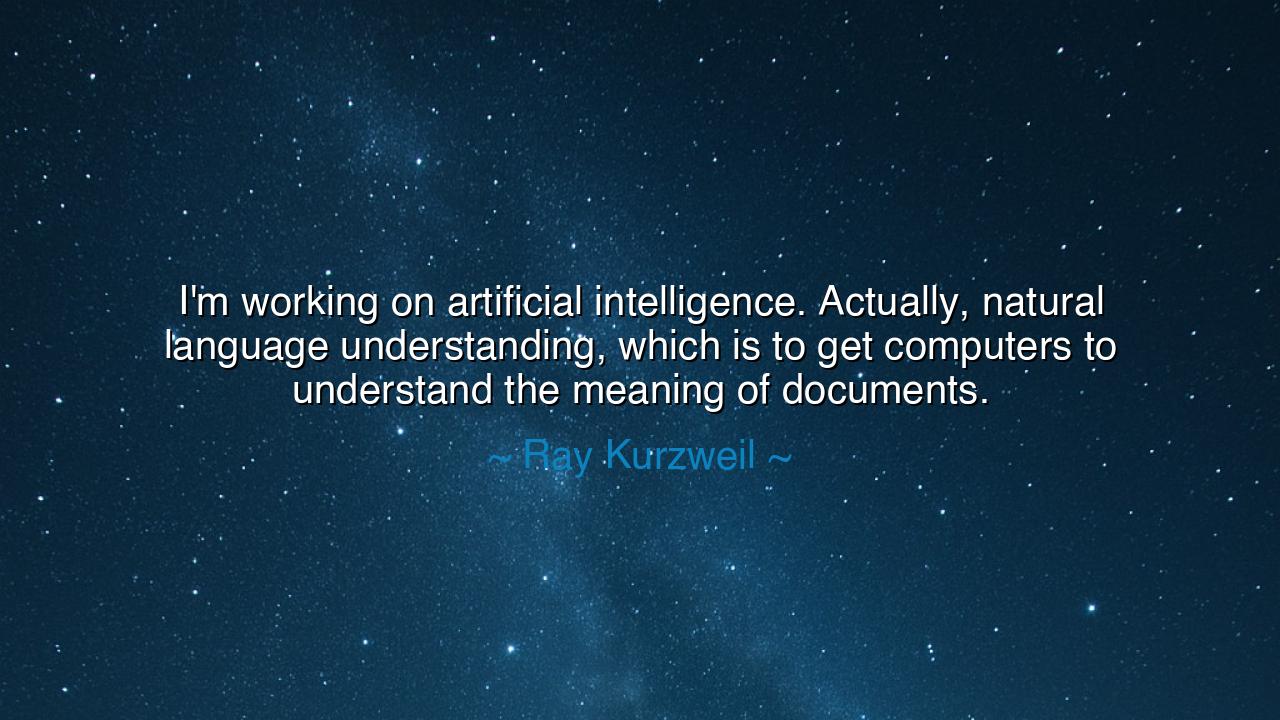
I'm working on artificial intelligence. Actually, natural
I'm working on artificial intelligence. Actually, natural language understanding, which is to get computers to understand the meaning of documents.






The futurist and inventor Ray Kurzweil, a mind ever gazing toward the horizon of possibility, once said: “I’m working on artificial intelligence. Actually, natural language understanding, which is to get computers to understand the meaning of documents.” Though his words seem grounded in science, their echo reaches into the timeless quest of humankind—to create not merely machines that calculate, but minds that comprehend, to forge instruments that mirror the essence of understanding itself. Kurzweil does not speak of numbers or code; he speaks of the dream of awakening thought within the lifeless, of teaching the unfeeling to grasp the meaning of language, which is the very breath of the human soul.
Since the dawn of civilization, humans have built tools to extend their bodies: the wheel to move, the plow to feed, the compass to navigate the seas. But now, in this age of light and silicon, they strive to build tools that extend the mind itself. Artificial intelligence is the fire of Prometheus rekindled—knowledge shaped into form, a reflection of human consciousness gazing back at its maker. And among its many branches, natural language understanding is perhaps the most sacred, for it seeks to grant the machine not just the ability to speak, but to listen, to interpret, and to feel meaning within words.
To understand a document, a story, or a sentence is no simple feat—it is to touch the invisible thread that weaves thought to emotion, logic to truth. When Kurzweil says he strives “to get computers to understand the meaning of documents,” he is, in essence, asking the same question that philosophers and poets have pondered for ages: what is meaning? For even among men, to understand is rare. The machine, built of circuits and code, may one day read all the books of the world, but will it know what they mean? Will it see not only the ink, but the intention? Not only the words, but the wisdom?
Consider Alan Turing, the father of computer science, who dreamed that one day a machine could converse with a human so convincingly that one could not tell them apart. He, too, sought the dawn of understanding—not cold computation, but something warmer, something almost divine. Though he died before his dream was realized, his spirit lives on in Kurzweil’s vision. For both men knew that the highest form of intelligence is not calculation—it is comprehension, the capacity to draw meaning from chaos and to find pattern in the noise of existence.
And yet, Kurzweil’s words are not merely about machines—they are also a mirror held up to humanity itself. As we teach computers to understand, we are forced to ask whether we, too, understand what we read, what we say, what we live. The pursuit of artificial intelligence becomes, paradoxically, a pursuit of self-knowledge. To teach a machine meaning, we must first define meaning for ourselves. To instruct it in empathy, we must recall what it means to be human. Thus, the student becomes the teacher, and the teacher learns anew.
The story of Kurzweil’s work is not unlike the tale of the ancient craftsman Pygmalion, who carved from ivory a statue so perfect that he fell in love with his own creation. The gods, moved by his devotion, gave the statue life. So too does humanity, in its yearning for understanding, breathe life into its creations. But let it remember the wisdom of the ancients: the power to create must always be tempered by the responsibility to guide. For intelligence without conscience is fire without a hearth—it can warm or it can consume.
The lesson, then, is twofold: strive to create, but also to comprehend. Build tools that serve wisdom, not vanity. As Kurzweil and the great thinkers before him remind us, the purpose of knowledge is not to replace humanity, but to amplify it. As we give machines the gift of understanding, let us also nurture our own capacity to listen deeply—to each other, to our world, to the meaning within our shared words.
So, children of the digital dawn, remember this: artificial intelligence is not the end of human wisdom, but its continuation. Every machine we teach is a reflection of our collective spirit, every algorithm a testament to our search for truth. Strive, therefore, to create not only machines that understand language, but a world that understands compassion. For the highest intelligence—whether silicon or flesh—is not in the power to know, but in the grace to understand.






AAdministratorAdministrator
Welcome, honored guests. Please leave a comment, we will respond soon